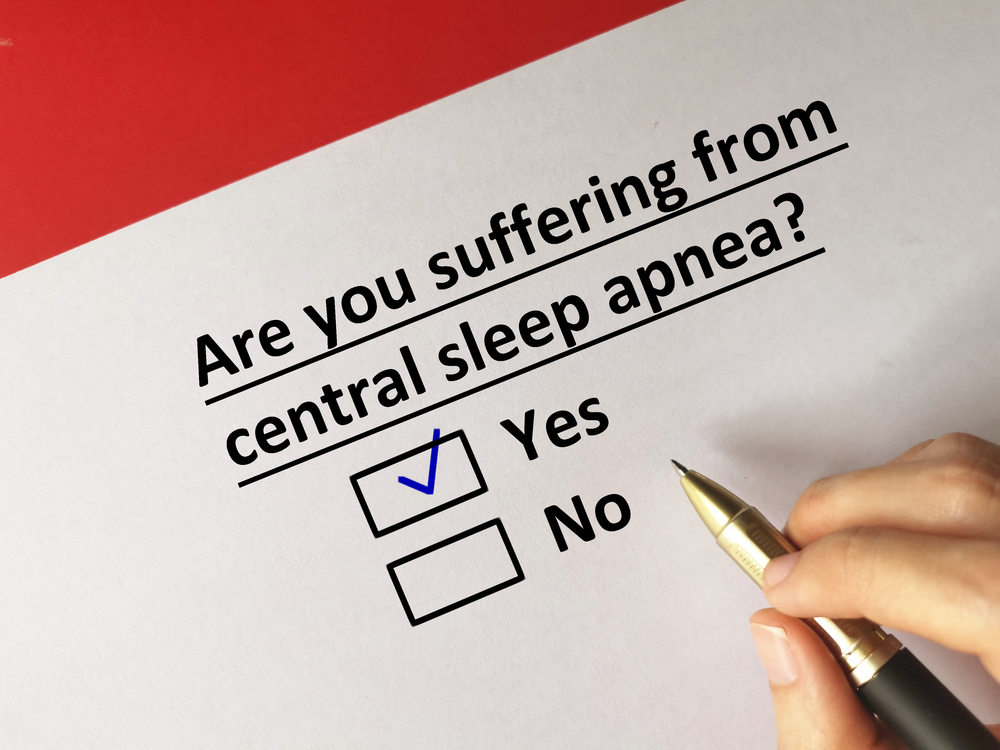 Sleep apnea is a condition that plagues millions of Americans. However, the majority of sleep apnea patients have a type known as obstructive sleep apnea, or OSA. What many don’t know is that there’s another kind of sleep apnea that is much less common; it’s called central sleep apnea, and it’s often associated with other medical conditions. Keep reading to learn more about central sleep apnea and the health conditions that can often lead to it.
Sleep apnea is a condition that plagues millions of Americans. However, the majority of sleep apnea patients have a type known as obstructive sleep apnea, or OSA. What many don’t know is that there’s another kind of sleep apnea that is much less common; it’s called central sleep apnea, and it’s often associated with other medical conditions. Keep reading to learn more about central sleep apnea and the health conditions that can often lead to it.
Central versus Obstructive Sleep Apnea
Before we dive into the medical conditions most often associated with central sleep apnea (CSA), it’s important to understand exactly what CSA is and how it differs from OSA. The more common form of sleep apnea, OSA, is caused by an obstruction in the airway—hence the name, obstructive sleep apnea. The body is attempting to breathe, but soft tissue in the mouth and throat relax during sleep, blocking the airway.
CSA, on the other hand, is not an issue with airway blockage at all; rather, it occurs when the brain temporarily stops sending signals to the muscles that control breathing. Those muscles “freeze” for a moment, and you stop breathing until those signals resume, or your body forces you to jerk awake so you can resume breathing normally. What causes these “short circuits” in those signals from your brain? Let’s talk about a few of those common conditions.
Drug-Induced Apnea
Certain narcotic painkillers and opioids can result in the development of CSA. A few common medications that can lead to drug-induced apnea include:
These drugs can cause irregular breathing patterns, including apnea. If you’re taking any of these drugs and you’re experiencing symptoms of sleep apnea, speak to your doctor to determine if they might be the cause.
Heart Disorders
Congestive heart failure and other heart disorders, such as atrial fibrillation (irregular heartbeats), can often impact a patient’s ability to breathe easily—both when awake and when asleep. It can also lead to a condition known as Cheyne-Stokes breathing, which is characterized by gradual increases and decreases in breathing effort and airflow. During the weakest breathing periods, a complete lack of airflow (apnea) can sometimes occur.
Stroke
Stroke victims can experience a variety of symptoms after their episode, and Cheyne-Stokes breathing can be one of them. As described above, Cheyne-Stokes breathing often leads to CSA while sleeping, so it’s important to watch for these altered breathing patterns after a person experiences a stroke. For some, breathing patterns may return to normal after some time has passed; others will continue to require the aid of a BiPAP to sleep comfortably.
Brain Tumors and Other Brain Disorders
Brain tumors and other conditions that impact the brain and brainstem can impair the brain’s ability to regulate breathing, especially while sleeping. Some of these conditions might be genetic conditions that develop over time, such as a Chiari malformation, or a traumatic injury, such as a structural brainstem lesion. When any kind of brain injury or condition is present, the odds of developing CSA increase significantly.
High Altitude
While not a medical condition, it’s worth noting that traveling to a location with a much higher altitude than you’re used to can also result in the temporary development of central sleep apnea. This form of CSA will typically resolve itself just a few weeks after you return to a lower altitude. However, if you’re permanently relocating to a higher altitude, and you develop high-altitude sleep apnea, you should speak to your doctor about getting a prescription for a BiPAP.
Idiopathic Central Sleep Apnea
Unfortunately, not all cases of CSA have a clear connection to another medical condition. These cases are referred to idiopathic central sleep apnea. In essence, this mean that there’s no clear reason for you to have CSA; this can be a frustrating diagnosis to receive, but the good news is that nightly use of a BiPAP can still provide you with the help you need to breathe regularly, rest well, and effectively manage your condition.
If you’ve been diagnosed with central sleep apnea, regardless of what medical condition it may be connected to, we can help you to find a BiPAP that meets your needs and can help you to sleep well again. We can also help with fighting CPAPs for patients diagnosed with the more common version of sleep apnea, OSA. Contact us today to learn more about how we can work with your doctor and insurance to get you the equipment you need.